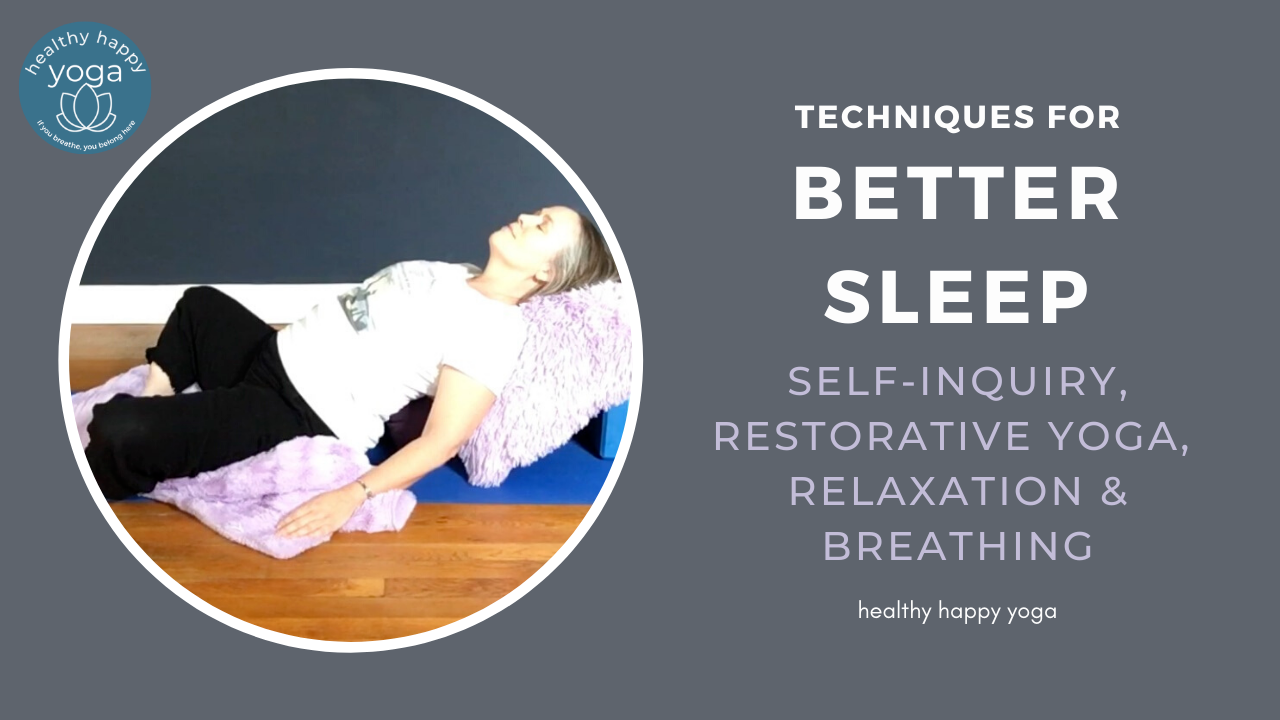
Can’t sleep? Struggling to figure out how to relax enough to sleep? Try these techniques right now, and then build the habits that help you the most.
How would it feel to wake up calm and energized instead of drained?
Are you struggling to relax enough to get good sleep? Our family has overcome a lot of issues stemming from anxiety, including sleepless nights and bleary, cranky days.
When I'm well-rested my whole family functions more smoothly. I've learned so much about the importance of sleep quality and quantity for neurological wellbeing in the past few years, as our family struggled and overcame a lot of issues stemming from anxiety. I know we're not alone. Knowing something is important doesn't equate to mastery, though. I struggled with keeping a sleep schedule, and the anxiety and overwhelm I felt left me wondering if I would ever wake up well-rested again.
This blog post addresses many of the most effective tips for better sleep quality that I've tested and taught.

My Sleep Story
I would fall asleep just fine, and then something would wake me - a snore, my bladder, a 2am garbage truck…
Often, it happened as soon as my head hit the pillow, and my chaotic day finally came to a close. I wondered, “Why is my heart racing now? I’m so tired; why can’t I just fall right asleep?” My anxiety went haywire.
There were many factors at once, and they snowballed. I had a young child with developmental delays. Peri-menopause. A cardiac arrhythmia. The accumulated feelings I had gathered throughout the day, without a creative outlet to process them. Childhood anxiety was resurfacing. I had always been a light sleeper.
Getting back to sleep took hours. This was the nice, quiet time my anxiety loved to string together every bead of worry and rumination it could find. I knew the morning would bring parenting challenges, work and who knows what unexpected hurdles. I wanted to be well rested so I could handle my life, be present for everyone and not be too much of a bitch. It was so frustrating to be missing out on precious hours of sleep!
Can Yoga Help You Sleep?
Do you wonder how to relax enough to sleep after your stressful day? Guided savasana and relaxing breathing have been shown to reduce stress in 85% of mindful yoga practitioners.
Being worried about not sleeping isn’t a useful state of mind when you are trying to sleep. Here are some things I did, and still do, instead. Many of my yoga and meditation students have benefited from these, too.
Simple Is Good
The techniques may seem simple. Simple is good. When we practice techniques to help us sleep better, we are not going for excitement. There’s too much excitement all the time, and we need to wind down from that. Trying hard to sleep is counterproductive. You can’t force yourself to sleep. You can repeat a simple practice over and over again, and you just might bore yourself to sleep.
How to Relax Enough to Sleep
These are the sleep practices which have helped not just me but also my restorative yoga students. They will help you relax and wind down after a stressful day. Try one of these techniques for a week. Don’t do them all at once. If you do, you won’t know which one helped, and may end up constructing a tower of sleep “crutches” that you feel you can’t live without. Take your time, see what you gravitate towards, and observe.
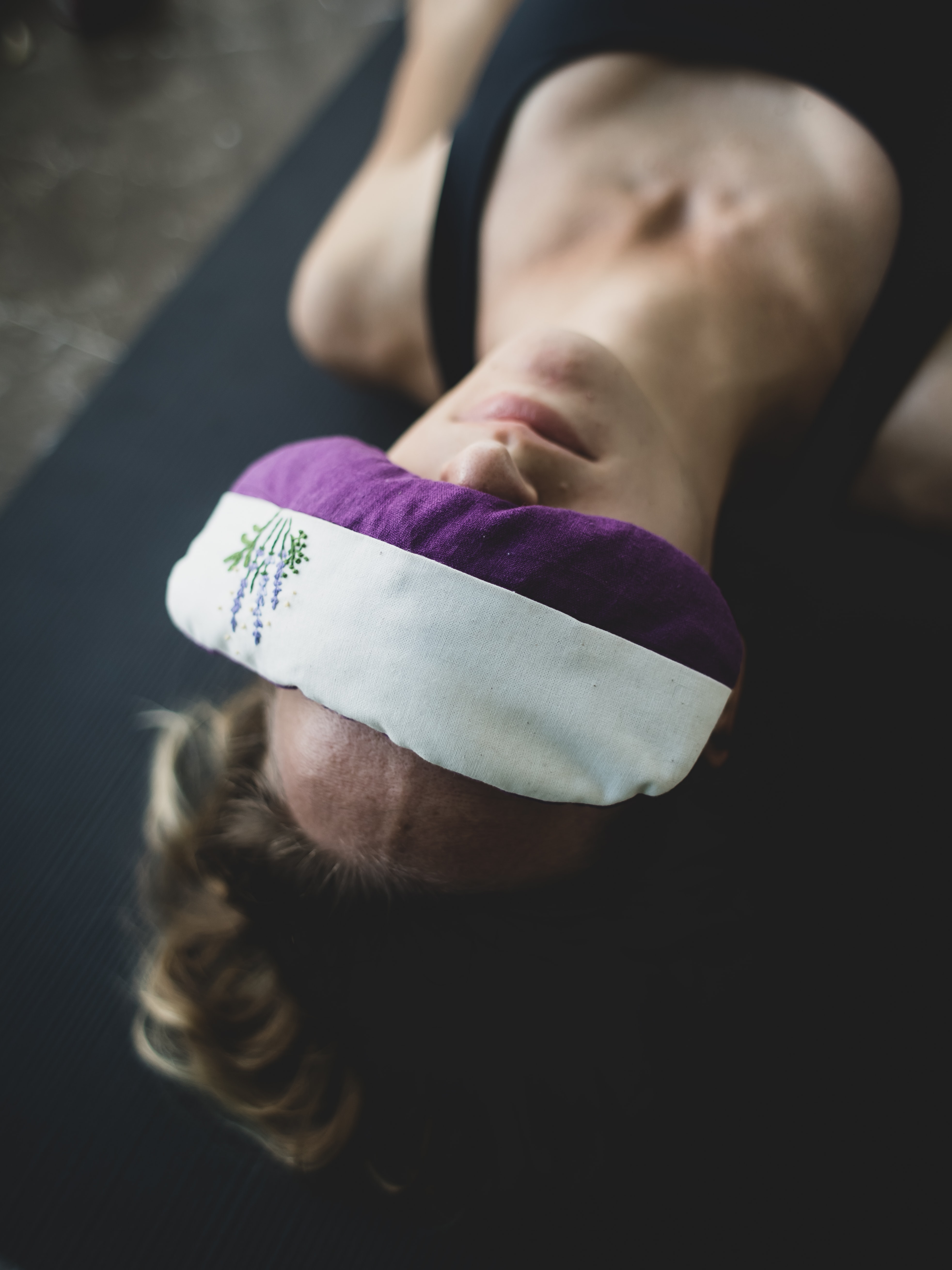
Restorative Yoga
Below you'll see a few pages from my e-book, Techniques for Better Sleep. It is part of my self-paced Restorative Yoga Techniques for Better Sleep course, which is also available inside my online yoga membership, The Compassion Club.
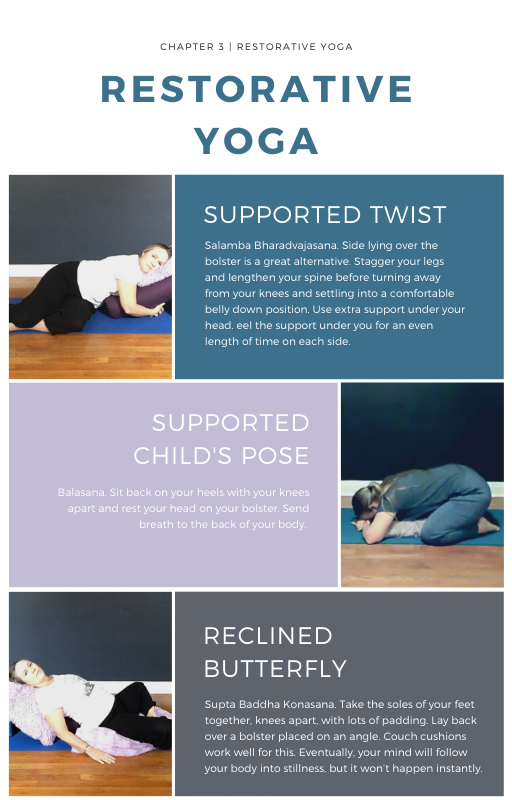
“I have learned some helpful sleep practices!
I have had fewer wake ups. I am able to use some skills from the class that help me return to sleep without completely waking.”
-Kathryn, restorative yoga student
Legs Up the Wall
Here’s my go-to restorative yoga pose before bed. Elevate your legs above your hips, heart, and head. Allow gravity to support you. Allow blood flow to nourish your organs in this gentle inversion.
Grab a blanket and find a wall or couch or chair. You can do this in bed if it is against a wall or sturdy headboard. Lie on your side in a fetal position. Move your seat near the wall or couch, but leave at least a few inches. Roll onto your back while sliding your legs up above your hips. Allow your knees to bend and adjust away from the wall until you’re very comfortable.
Cover yourself and make sure you’re warm. You can use a thin pillow under your hips or head.
Variations I like:
- Try draping the blanket over your feet.
- Try flinging your forearm over your eyes, or use your palms to put gentle pressure on the bones around your eyes.
- Try sliding the soles of your feet to touch, allowing your knees to drop open gently. Don’t go for a big stretch, but for a sense of ease.
When you’re ready to change positions, move your hands and feet, reach your arms up above your head along the floor, and yawn. Then, bend your knees closer to your chest and roll onto your side. You are welcome to stay there if you’re already in bed.
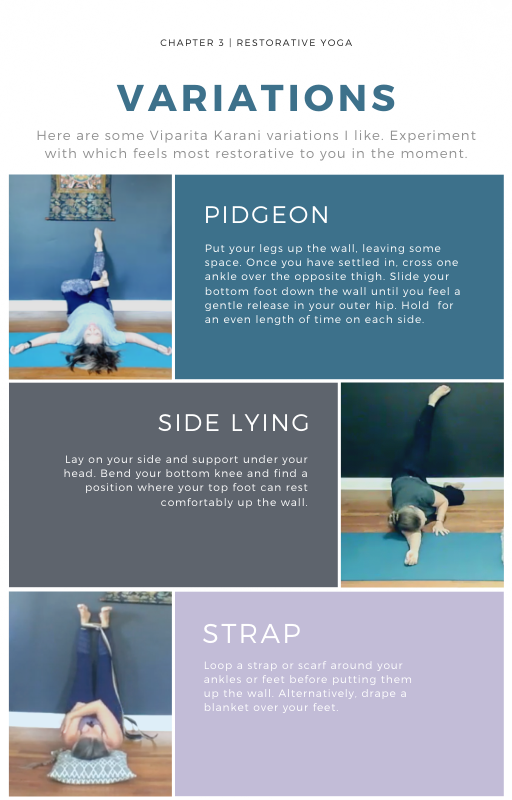
Redirection
Focus on a Detailed Sequence
Visualize each step in an everyday activity or task. I rarely get to the end before falling asleep. However, if that doesn’t happen, I tell myself that my body is resting, and that is helpful too.
Count Down From 100
I learned this simple practice from a prenatal yoga student who used it with success for her insomnia. Its simplicity has been a blessing. It is easy to remember, teach, share, and replicate.
Progressive Relaxation
This is my favorite practice for when anxiety arises, and I want to feel present in my body. Create your cozy nest in bed. Sink like a sandbag into the support under you. Gather blankets and cushions so you feel supremely comfortable.
Scan from head to feet for grounding. Tighten your muscles to go deeper into the tension. Give it space to express itself, and then let it go. You can do this any time throughout the day. It gets easier to scan your body with practice.
Download 3 free audio guided deep relaxations I recorded for you.
Mindful Breath
Focus on any one aspect of your natural breath, non-judgmentally — the path of your breath, its temperature, depth, speed, the rise and fall of your belly, or the sensation at the very edge of your nostrils.
When your mind wanders, guide it gently back to your point of awareness.
Habits to Support Sleep
Use these techniques to build the habits that can lead to a relaxing bedtime.
Self-Inquiry
Getting back to some basic journaling helped me to metabolize my accumulated emotions. Giving myself a creative outlet for self-inquiry reawakened a part of me that felt neglected and wanted to be remembered. I started with jotting down a few thoughts before bed and then began writing more and more. You may have a different creative outlet.
You can ask yourself questions for self-inquiry, or find your own way to allow self-expression.
For example, ask yourself some interoceptive questions:
- “Am I in my body?”
- “What sensations do I feel?”
- “How am I taking up space?”
Ask yourself some questions about sleep:
- What “shoulds” are you telling yourself around sleep?
- What one thing do you know would help you sleep better, but you’re not doing it?
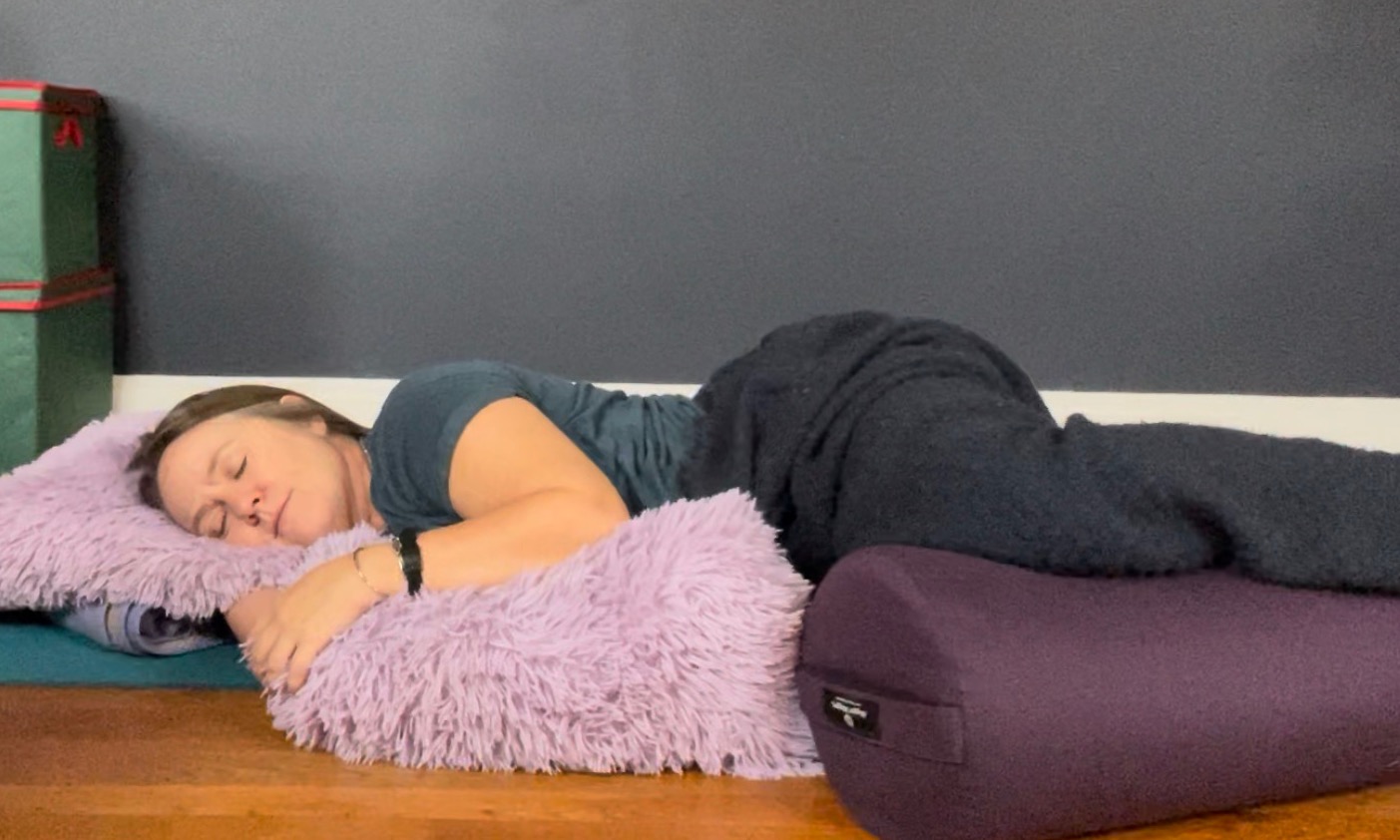
Changing Habits Is Hard
You can do hard things! Tie the habit to something you already do, that you are in control of. I was usually on my phone or laptop, so I programmed my devices to turn off at the same time every night.
The far off reward of feeling better in the morning may not be enough at first. Because of the way our brains work, forming a new habit requires an immediate and motivating reward. Literally give yourself a treat to train your brain that it likes this new habit.
I was motivated by listening to a soothing relaxation recording once I got in bed. That was a reward that worked pretty well for me, although if I could eat chocolate right before bed that probably would work even better! However, the consequence for my teeth would not be so great.
Don’t use this process as another way to judge yourself. Miss a day? Start again. You have infinite chances to change your habit. It isn’t easy, but you are a grownup, and you can decide to do it.
Ask for gentle support and accountability in your new habit. In my membership, we hold each other accountable with compassion. You can create your own compassionate circle.
You have infinite chances to change your habit. It isn’t easy, but you are a grownup, and you can decide to do it.
Over time, with accountability, support, and a lot of backsliding, I embedded the habit of a consistent bedtime. On that foundation, I layered on self-inquiry, restorative yoga, redirection, body scan, and breathing tools as needed. Sometimes I combine them now, but still keep it simple. Remember, simple is good.
Am I sleeping better myself, you ask? Yes!
I am so grateful to report that I’m getting a cozy eight hours. I’m drifting back to sleep easily when my husband snores or an ambulance passes. I’m waking up without an alarm feeling relatively energized and kind. The practices helped, but also I stopped trying so hard.
A Deeply Relaxing Gift for You
Sometimes all I need is a "power savasana." I put my legs up on the couch, cover up with a snuggly blanket and listen to a soothing guided body scan.

Trying hard to sleep is counterproductive. You can’t force yourself to sleep. Occupy your mind and release your body so that sleep can sneak up on you softly.
Surrender to sleep. Allow it to approach, and it will embrace you gently.
An earlier version of this blog was published in Better Humans.
Download 3 Free Audio Guided Relaxations
"It worked so well for me. I was so cozy and comfy that I could not get up from my nook. I had fallen asleep and then fell back to sleep.”
-Ilana A.
I've learned so much about the importance of sleep quality and quantity for neurological wellbeing in the past few years.
It turns out I already had the most effective sleep support at my fingertips:
Guided relaxation and breathing have been shown to reduce stress in 85% of mindful yoga practitioners.
So if stress is keeping you awake, I want to give you these 3 guided relaxation audios, so you will have some support in winding down before sleep.
Step 1. Grab my 3 free audio guided deep relaxation recordings.
Step 2. Create your cozy nest in bed. Gather blankets and cushions so you feel supremely comfortable.
Step 3. Listen... and surrender to sleep. Repeat!
Want More Support?
Struggling to relax enough to get good sleep?
How would it feel to wake up calm and energized instead of drained?
This self-paced restorative yoga course is perfect for you if you want to wind down from a stressful day before going to sleep. The accumulated feelings you gather throughout the day will have time to metabolize and release. You will gently tone your nervous system and quiet your mental chatter.
Nourish your nervous system, rewire your sleep patterns, and integrate new habits into your life.
I've learned so much about the importance of sleep quality and quantity for neurological wellbeing in the past few years. I've learned the most helpful techniques to invite deeper rest. It turns out I already had the most effective sleep support at my fingertips...
In this comprehensive restorative yoga course, you'll learn my most effective practices for better sleep.
Techniques for Better Sleep is a soothing and calming course designed for long-term transformations that can impact every part of your life. Results will come as you integrate new habits into your life sustainably.
The self-guided course allows you to set your own pace and repeat the practices that you resonate with.
- Practice along with 6 full-length restorative yoga videos designed to soothe your nervous system and send you off to sleep.
- Use the Kajabi app to access your videos anywhere, including in bed.
- Download the supplemental e-book and audio recordings that will help you retrain your nervous system.
- Ask me questions via email or in course comments. I love supporting your sleep progress.
- Track your progress over time with 6 self-reflection check-ins to help you stay mindful and motivated.
Get Restorative Yoga Techniques for Better Sleep
How would it feel to wake up calm and energized instead of drained?
In this comprehensive restorative yoga course, you'll learn my most effective practices for better sleep. The accumulated feelings you gather throughout the day will have time to metabolize and release. You will gently tone your nervous system and quiet your mental chatter.
Nourish your nervous system, rewire your sleep patterns, and integrate new habits into your life.
Stop Walking On Eggshells!
Gentle yoga to release your stress and shift your mindset about struggle.
If you get your buttons pushed often by other people's issues, you may be hypervigilant. You might feel it in your body as clenching, tension, or chronic pain.
You'll become more grounded in awareness of your body.

